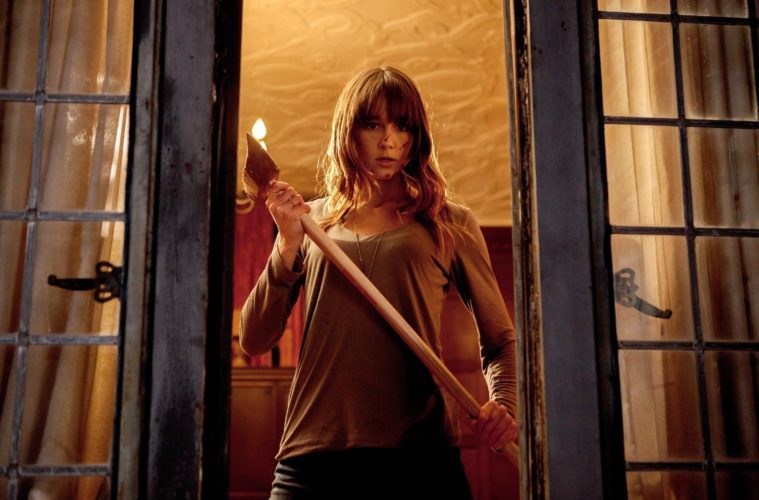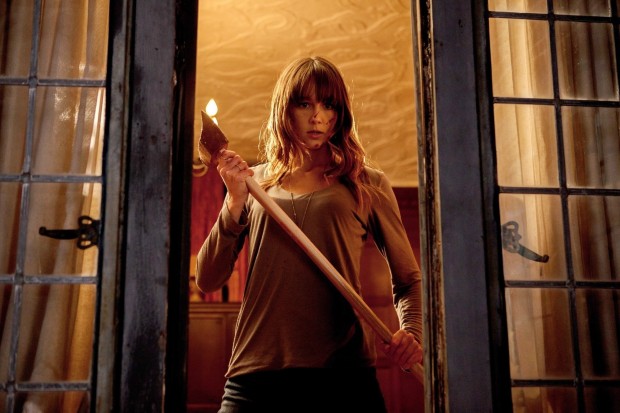
In 2011, a little horror film called You’re Next premiered at the Toronto International Film Festival and was almost immediately snapped up by Lionsgate. For many, this news didn’t even make their radar, but for horror genre fans, the fact that a second screening was pulled from Fantastic Fest weeks later meant something was up. Now, nearly two years later, the film, which had gained almost a cult status already, is ready to be unleashed on a mass audience this weekend. And it’s a lot of fun.
After its third unveiling during SXSW this year I was able to join a roundtable with the film’s star, Sharni Vinson, to talk about her role. If you haven’t heard of the actress before, this film will put her on any genre fan’s map and is a great introduction for those curious. Together we talked about how she took this role specifically for the physicality, how it felt to try to balance the horror elements with the genuine humor of the film, the way this film was radically different from her previous studio movies, and much more. I’ve also highlighted a few spoilers towards the end as well. Read on to check out the entire discussion.
The Film Stage: You had a really physical role. Did you do any training for this?
Sharni Vinson: Yeah, I did. That’s part of what I look for in a role. Something that I can bring a lot of physicality to and definitely action. I grew up a swimmer. I was in a state swim squad for 15 years and I was also a ballerina, horse rider, surf life saving club. So a lot of professional athletes in my family and I feel like I have a lot of energy to expel. So I get a little bit bored sitting on set, waiting around to just stand up and deliver a line every now and then. I constantly need to be doing something. So the training in this movie utilized all my free time as well. Which I enjoyed. Like I said, I like to be constantly doing something. So if I wasn’t actually working on set I was away working with the stunt coordinator and we were at a martial arts studio. We were doing a lot of reactive exercises which were really important for me.
For this role it wasn’t so much the challenges of the physicality, because I feel like a natural athlete to begin with, which is why I’m seeking these roles. But it was more the mentality of where she was coming from. If a girl has been brought up on a survivalist compound, it’s a very specific mentality that comes with that. So the training that I was given that benefited me the most was reaction time. I had a specific exercise where I would stand at the back of a wall and from the other end the stunt coordinator would be flying objects at my face. He would just pick me up like a baseball mitt and *PFFT* — I would have to duck and move. Respond quickly. He was getting me used to, “This is what she would do.” She would hear a glass break before anyone else. She’s trained internally to hear these noises and almost see things coming before they happen and to respond quickly. So it was that type of training that got me to into the mentality of the girl. Which was really beneficial.
 One thing I noticed, and appreciated, is that there are a lot of practical effects on this film. And it sounds like you were very much a part of the physicality of this role. So how much of the stunts were actually you and how much was a stunt double?
One thing I noticed, and appreciated, is that there are a lot of practical effects on this film. And it sounds like you were very much a part of the physicality of this role. So how much of the stunts were actually you and how much was a stunt double?
Basically, in a nutshell, everything is me… except for the jump through the window. The reason that’s not me is because the producers would not let me do it. I begged them. We actually sat there and had a minor fight about it. These are the reasons that I take these roles. I want to jump through that window. Not everybody does want to do that and people are begging for a stunt double. But I love that sort of thing. You’re getting to land on a bunch of mattresses that are all boxed up. But it’s more the safety of it. I could go through that window and this glass can cut you. Then your lead actress probably isn’t in the best shape that they need to be for tomorrow. So I was like, “So let’s shoot it the last scene. Let’s do it last. So if I injure myself, it doesn’t matter.” I don’t care. So yeah. Everything in the film is me except for the jump through the window, which would have been me if I had my way! [Laughs].
Can you talk about Adam Wingard’s directing style and how much you were able to bring in and that interaction on set?
Adam’s directing style was completely foreign to me because I had come from doing three studio movies and this was the first independent film that I had ever done and this was the first director that I’ve worked with that I felt like he just got involved. There was not a moment on set where he did not have that camera on his shoulder and he wasn’t moving around with us and sweating. He was putting his heart and soul into every single moment of this film. He’s not scared to go outside the commercial box. This was probably his most commercial film to date. Yet it’s still very much thinking outside the box and the way that he gets in there with the camera. You don’t know what he’s shooting, ever, really. Whereas with a studio movie you know exactly what’s going on. “This is your establishing wide and we’re going to come into a two shot and then mid and closeup.” You know exactly what is going on. But with him, he’s constantly moving around and just getting pieces here and there and everywhere. So the day I sat down to watch the end result of the movie, I had no idea what footage he had captured, at all.
I just knew it was good from what I had seen him shoot with other actors on the set. And the input, he gave us the freedom to create and develop these characters, even as we went along on the day, in the moment. We were very much a team. There was no one saying, “This is how it should be done,” or “This is how I see it.” Everybody developed their characters and it all just fell into place. We worked with a lot of improvisation as well. And that’s new for me, too! I’m used to getting a script and studios like word for word delivery. This one was so much freedom. It’s just really refreshing to be able to live in the moment as an actor and really, truly, naturally respond to situations that you don’t know are coming. You don’t know what someone’s going to say. I mean, AJ [Bowen] changed that monologue every time he did it. So the reactions were real. It provided these very small but real moments, and that was thanks to Adam in giving us that creative freedom.
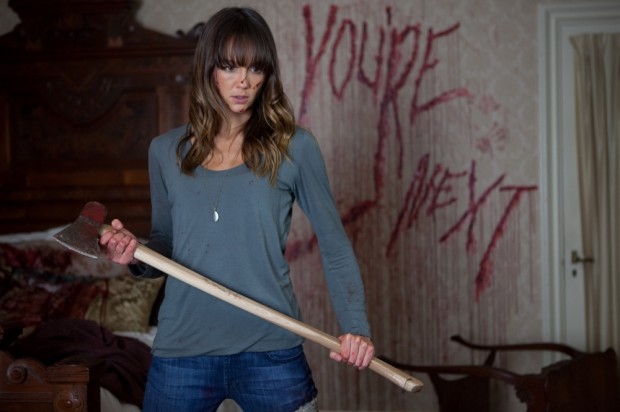
The film premiered at TIFF in 2011 and I’m curious, watching it last night, if you see it any differently now?
I think I do. There’s been some minor adjustments. And I do say minor because I feel like when we shot this movie and delivered it to Toronto it was at a standard that could have been released then and there. But since Lionsgate have taken the movie I feel like it’s been Lionsgated; sweetened. It’s beautiful. The colors are better now and the sound is better and there’s a couple of scenes like the opening scene has a little more added to it to give that initial gore. We originally shot two endings to this movie. But test screenings ruled out the other ending. I think the wait has been such an interesting part of the process of this film developing and it’s been really, really unusual to sort of screened it two years in advance of its actual release date and then to sort of sit and wait. But to see it last night, I felt like that was the best it ever looked. I felt like that was the best crowd reaction that we’ve got to date. Maybe there were some people in there that were seeing it for the first time. Maybe there were some people that were seeing it for the second or third time if they were at Toronto or Fantastic Fest. The reactions never cease to amaze me that people get it. They laugh when they’re supposed to laugh and they’re scared when they’re supposed to be scared. They really get behind Erin (Vinson) and cheer her on. There’s nothing more satisfying than last night and watching it. Especially after that gap and seeing, “Oh, wow, yeah, we’re still here.” People still dig it. They get it. So it was very rewarding.
How is it for you trying to balance those types of reactions? Because it’s kind of satirical but it’s also straight horror, too. Do you know exactly what you’re trying to achieve, when?
That’s so interesting because that was something I found really challenging with this film. When we’re shooting it, especially that dinner table scene. Which could be its own movie. I believe there’s like 18 hours of footage. We shot that scene for like two days. It was unbelievable because Joe [Swanberg] and Ti [West] just kept going. No one knew what was coming and it just kept unfolding. Because of that particular scene, that was one of the first scenes that we shot and I think what happened for me was I sat there watching this unfold and I thought, “Are we shooting a horror or a comedy?” This stuff is funny. Then it became apparent to me that we had very comedic actors on set that were bringing an element of humor to this situation that’s totally not humorous and it was working. I thought, “Am I supposed to be funny, too?” It was an interesting balance to get the realism in that situation. Let the other characters be funny. You just be that girl.
So you’ve done another sorta satirical horror film with Bait.
Totally different type of satire.
But it didn’t take itself quite so seriously and it was more of a big studio film. But after your experience with You’re Next and the type of reaction you can get from the crowd for You’re Next, do you see yourself trying to explore more horror films or independent horror movies?
I am just one of those people that… If I see the role and I feel like that is my next role, then that’s what I’m doing. I don’t care if it’s independent. I don’t care if it’s studio or horror. I’m not married to anything specifically. It’s just more feeling like I could connect with the role I just read. I felt like when the You’re Next script landed in my hand, the first time I read it from a very general audience perspective and then the second time I read it I read it as Erin’s perspective. And just trying to visualize Sharni as Erin and what qualities of Sharni could I bring out in Erin. Or what qualities in Erin do I want to instill in Sharni. That’s how I tried to be real with that character and find that balance.
Did you and AJ talk about your relationship? Because you’re kind of the newcomer to the whole equation. Did you all maintain a kind of distance or did you all work out a nice backstory and bring that?
AJ was just one of those people that as soon as I met him, he’s just amazing. You can’t not get along with him so chemistry… too easy. We would just sit there and joke around. We really all became a huge family in this. We didn’t really almost need to [have a backstory]. We just got it and were just able to within a day of meeting vibe off one another. Find those quirky coupley moments that you would share and just laugh. It unfolded very genuinely.
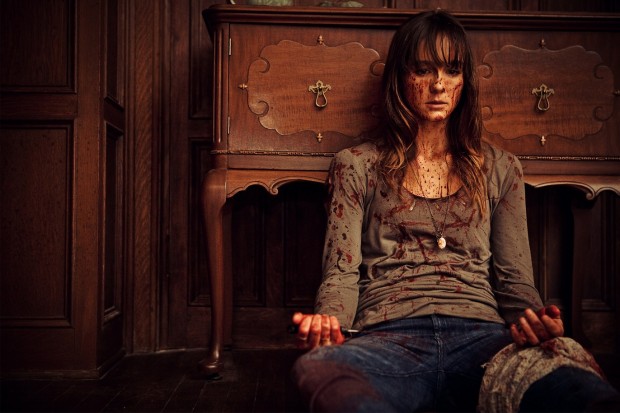
SPOILERS:
So what was it like to get to play the bad bitch in the horror movie as opposed to all the other female characters who died really early or were portrayed as really weak?
[Laughs]. It’s the dream role of that girl that everyone wishes they could be in that situation if presented with it. Home invasion is something everyone has probably sat there and said, “That would be really scary. If someone came into my home, I’d hope that I could defend my house and protect my family.” But that’s not always the case because if someone is out there with a weapon and you’re not. So it was nice to be able to sort of break ground in that territory and feel like this character is kind of a role model for women. She could really be that strong girl that is very sweet and vulnerable and innocent in the beginning so I feel like that gives the audience the opportunity to get that she’s just a normal person. In this situation she’s trying to impress the mom for the first time and then it all gets out of hand. So it’s the most rewarding thing for me to be a positive role model for women and that’s definitely this character.
There’s a certain intelligence in the way that this film is pulled off in terms of story. Whether it’s one of the invaders hiding out in a closet and you reveal the bottles of piss. So clearly there’s some thought put into all of this by Adam and Simon [Barrett]. Did you ever challenge them and maybe ask, “Well, why is it like this?”
Let me think because it’s going back two years now. [Laughs]. I’m definitely the first person that if I sense anything may not be realistic, I’m not going to do it. If there’s a line there that isn’t working for me because I don’t think in that situation that is what Erin would say or some writers have a tendency to overwrite and over explain. I’m someone that will come into it and say, “Do you need this line? Because I can give you this line in a look.” It’s going to be so much more powerful and you will be able to understand. The audience is not stupid. I don’t like it when—and Simon Barrett doesn’t do this—writers almost consider the audience to be stupid and over explain and overwrite. There’s no need because especially with the horror genre audience, very smart and they know what they want and can totally think outside the box and make up what’s happened. They don’t need it to be overplayed or overwritten. They just need to believe it and that’s just getting the realness to it. So I would just try to take out any lines that I felt were in there unnecessarily and replace them with a look, a movement, or an action instead. And Simon and Adam were great because they let us transform as the characters and this was a film that developed every day as we went along.
You said that you brought all the athleticism to the role and you liked how Erin was portrayed as a role model. Did you look to any other final girls or anything in the genre for inspiration when you were trying to shape her personality?
A lot of people do ask me that and I didn’t really. I grew up watching a lot of horror movies when I was young. Something, and I don’t know exactly what, changed in me to become the person that doesn’t watch a lot of television and a lot of films these days. Maybe I’m busy. I’m too physical to sit down and just give it an hour to watch TV. But what I try and do is avoid [looking at other roles]. Maybe that’s right. Maybe that’s wrong. But everybody has their own strategy and I just don’t want to ever be like anybody else. I always try and find the genuine parts about myself that can go into the character.
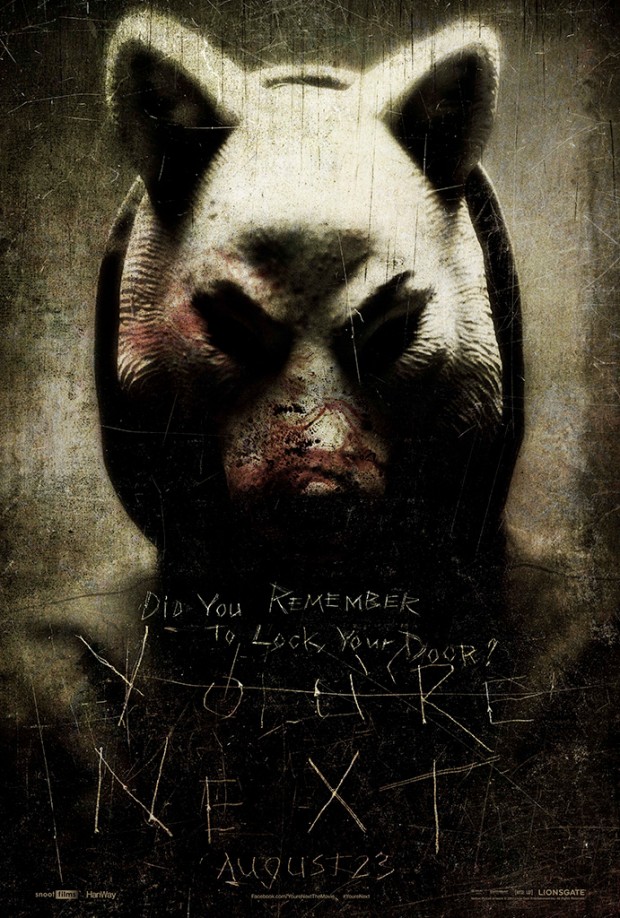
You’re Next opens on Friday, August 23rd.

